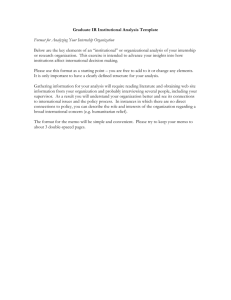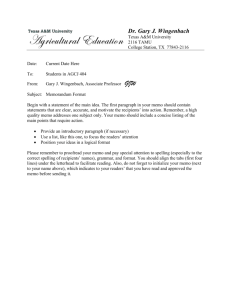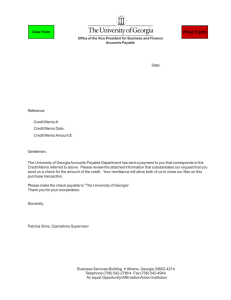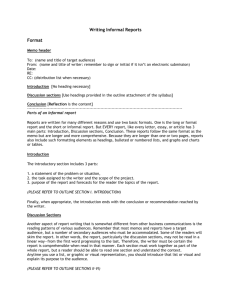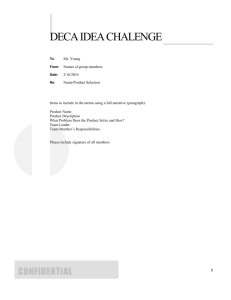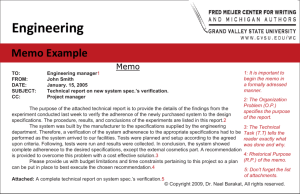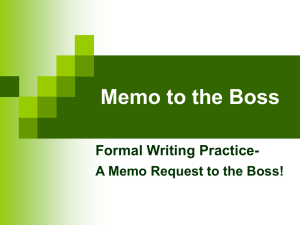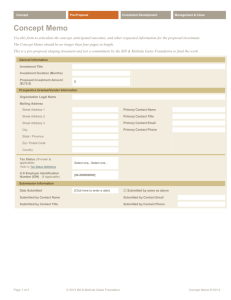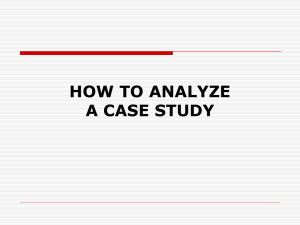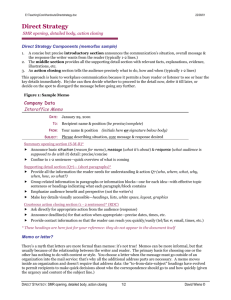Sample memo #2
advertisement
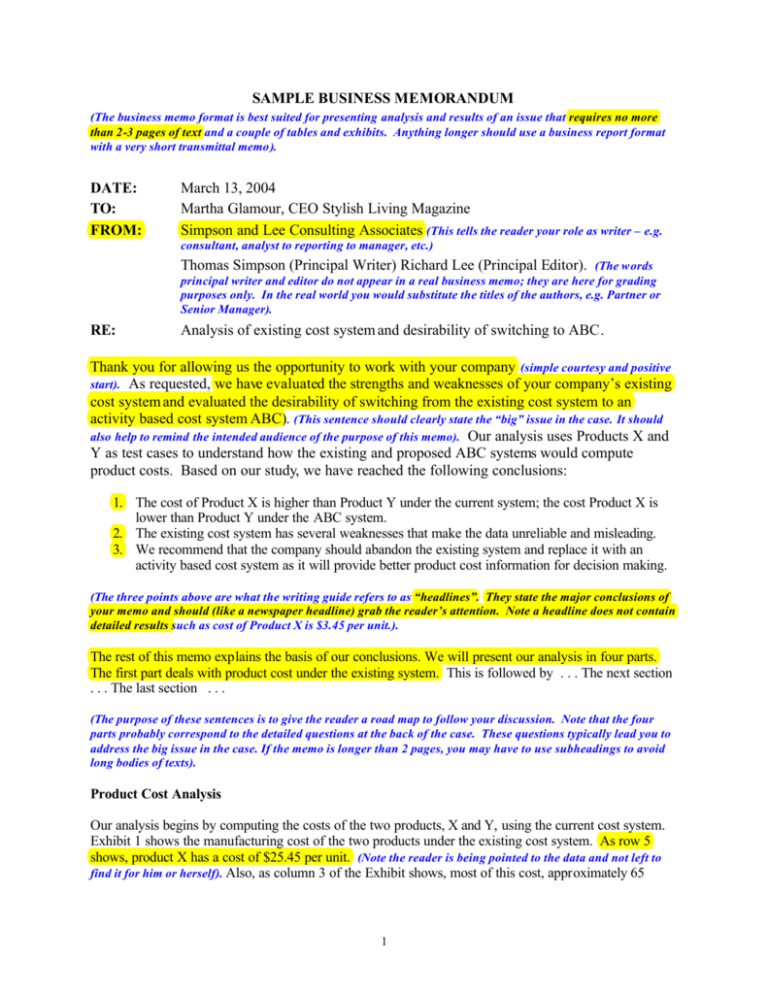
SAMPLE BUSINESS MEMORANDUM (The business memo format is best suited for presenting analysis and results of an issue that requires no more than 2-3 pages of text and a couple of tables and exhibits. Anything longer should use a business report format with a very short transmittal memo). DATE: TO: FROM: March 13, 2004 Martha Glamour, CEO Stylish Living Magazine Simpson and Lee Consulting Associates (This tells the reader your role as writer – e.g. consultant, analyst to reporting to manager, etc.) Thomas Simpson (Principal Writer) Richard Lee (Principal Editor). (The words principal writer and editor do not appear in a real business memo; they are here for grading purposes only. In the real world you would substitute the titles of the authors, e.g. Partner or Senior Manager). RE: Analysis of existing cost system and desirability of switching to ABC. Thank you for allowing us the opportunity to work with your company (simple courtesy and positive start). As requested, we have evaluated the strengths and weaknesses of your company’s existing cost system and evaluated the desirability of switching from the existing cost system to an activity based cost system ABC). (This sentence should clearly state the “big” issue in the case. It should also help to remind the intended audience of the purpose of this memo). Our analysis uses Products X and Y as test cases to understand how the existing and proposed ABC systems would compute product costs. Based on our study, we have reached the following conclusions: 1. The cost of Product X is higher than Product Y under the current system; the cost Product X is lower than Product Y under the ABC system. 2. The existing cost system has several weaknesses that make the data unreliable and misleading. 3. We recommend that the company should abandon the existing system and replace it with an activity based cost system as it will provide better product cost information for decision making. (The three points above are what the writing guide refers to as “headlines”. They state the major conclusions of your memo and should (like a newspaper headline) grab the reader’s attention. Note a headline does not contain detailed results such as cost of Product X is $3.45 per unit.). The rest of this memo explains the basis of our conclusions. We will present our analysis in four parts. The first part deals with product cost under the existing system. This is followed by . . . The next section . . . The last section . . . (The purpose of these sentences is to give the reader a road map to follow your discussion. Note that the four parts probably correspond to the detailed questions at the back of the case. These questions typically lead you to address the big issue in the case. If the memo is longer than 2 pages, you may have to use subheadings to avoid long bodies of texts). Product Cost Analysis Our analysis begins by computing the costs of the two products, X and Y, using the current cost system. Exhibit 1 shows the manufacturing cost of the two products under the existing cost system. As row 5 shows, product X has a cost of $25.45 per unit. (Note the reader is being pointed to the data and not left to find it for him or herself). Also, as column 3 of the Exhibit shows, most of this cost, approximately 65 1 percent, is indirect manufacturing overhead. The last row of the Exhibit shows that . . . (Rest of the details omitted intentionally). Exhibit 1 Costs of Manufacturing Product X and Product Y ___________________________________ Insert table here (Note that EXCEL tables and PowerPoint flowcharts can be pasted directly into your document. Make sure that EXCEL tables fit the width of your page and PowerPoint flowcharts should be pasted as pictures(use the Paste Special command). ___________________________________ Weakness of Existing Cost System The current system of assigning overhead to products using direct labor hours does not represent a fair measure of resources used by the products. Your company produces a large variety of products in low volume with highly automated operations. Direct labor accounts for only 3% of the total cost of manufacturing (See Exhibit 1). In your production environment, most of the indirect manufacturing costs are driven by cost drivers that have little or no relationship to the amount of direct content of each product. The relevant cost drivers in your situation are . . . (Rest of the details omitted intentionally). Conclusion and Recommendations (Not you are reiterating what you said up front one more time). . We recommend that the company abandon its current cost system and replace it with . . . (Rest of the details omitted intentionally). This will allow you to better measure the resources consumed by each product and lead to better pricing and product mix decisions . . . (Rest of the details omitted intentionally). http://www.csun.edu/bus302/Course/Communication/samplememo.pdf 2
